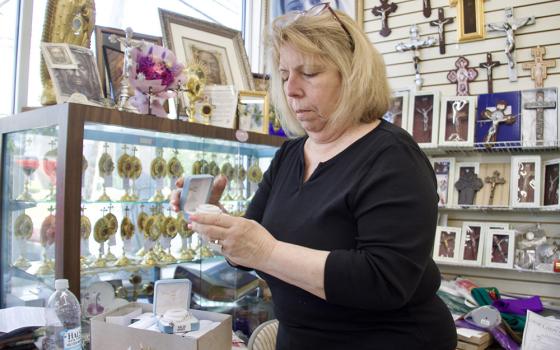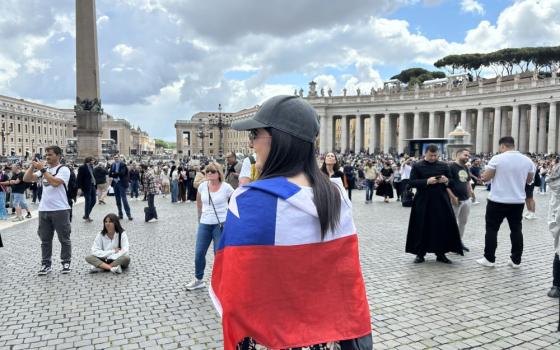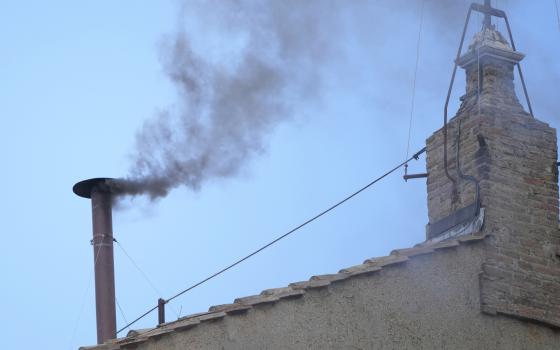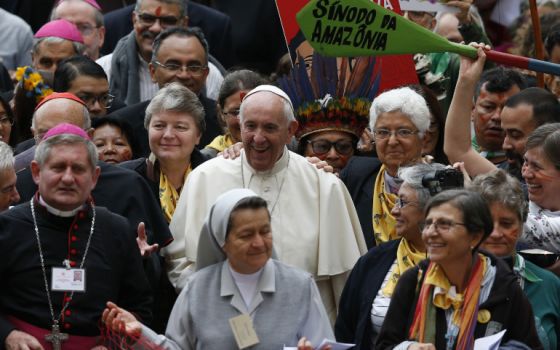
Cardinal Fridolin Ambongo Besungu blesses a woman during a gospel music festival in Kinshasa, Democratic Republic of Congo, Jan. 29, 2023. (OSV News/Reuters/Luc Gnago)
If Catholicism's future is in Africa, as is so often touted, then when, not if, will there be an African pope in the modern era?
There have been three popes who have hailed from North Africa, the last one being Gelasius I, who reigned A.D. 492-496.
Today's Roman Curia is lacking African leadership. No Vatican office is currently headed by an African. The most well-known prelate on the continent is undoubtedly 65-year-old Cardinal Fridolin Ambongo Besungu of the Democratic Republic of Congo.
Although Ambongo Besungu went to great efforts to stress his allegiance to Francis, it would be fairer to assess the relationship as one built off of pragmatism and reflexive loyalty to the pope, rather than true partnership.
Born in the tiny town of Boto, in the northwest corner of Congo, as the son of a rubber tree farmer, Ambongo Besungu entered the Franciscan Capuchin friars in 1981 and was ordained a priest in 1988, after studying moral theology at Rome's Pontifical Alphonsian Academy.
Ambongo Besungu served as both major superior and the vice provincial for the Congolese Capuchins and had a brief academic career at the Catholic Faculties in Kinshasa, the nation's capital. In 2004, Pope John Paul II appointed Ambongo Besungu, at the young age of 44, bishop of the Bokungu-Ikela Diocese.
By the mid-2010s, Ambongo Besungu had become involved in the Congolese Episcopal Conference's Commission of Justice and Peace and the conference's Commission for Natural Resources, eventually serving as president of both. During this time, he frequently traveled around to Western capitals with a simple, but direct message on exploitation: Hands off Africa!
In 2016, Francis named Ambongo Besungu archbishop of Mbandaka-Bikoro. Just two years later, in 2018, Ambongo Besungu became coadjutor of the Kinshasa Archdiocese, where he succeeded his late mentor, Cardinal Laurent Monsengwo Pasinya, a close collaborator of Francis and a legend in both the church and the country.
In Africa, Ambongo Besungu, like his predecessor, has become a leading voice among his confreres. He has served in a range of high-profile positions, including as the vice president of the National Episcopal Conference of the Congo and as host of Francis' wildly successful visit to Kinshasa in 2023. Currently, Ambongo Besungu is the president of the Symposium of Episcopal Conferences of Africa and Madagascar (SECAM), making him the de facto spokesman for all of Africa's Catholic bishops.

Cardinal Fridolin Ambongo rides in the popemobile with Pope Francis, who greets the crowd at the start of a meeting with young people and catechists in Martyrs' Stadium in Kinshasa, Congo, Feb. 2, 2023. (CNS/Paul Haring)
After receiving the cardinal's red hat in 2019, the Capuchin prelate was appointed a member of the Vatican's Dicastery for Institutes of Consecrated Life and Societies of Apostolic Life, which oversees religious life around the globe. In 2020, he was appointed to Francis' Council of Cardinals, which met quarterly to offer guidance to the pope on church governance and reform.
Given Ambongo Besungu's role on the council, it was all the more surprising that after Francis signed off on a declaration allowing for priests to bless individuals in gay relationships in December 2023, the Congolese cardinal came out with a statement bluntly titled: "No blessing for homosexual couples in the African churches."
The statement, which was issued in his capacity as head of SECAM, was published after the cardinal immediately flew to Rome to discuss the African backlash with the pope and the head of the Vatican's doctrinal office, which had released the declaration.
While the statement emphasized that the bishops of the continent were in full union with Francis, they made clear that they would follow a different course. It was a near unprecedented defiance of papal authority by bishops on an entire continent.
Almost overnight, Ambongo Besungu's star was on the rise among conservative prelates and even among more moderate-leaning ones who viewed the pope's executive action on such a sensitive topic to be an overreach, especially in an era where synodal governance has been the theme du jour. The African cardinal himself spoke to this, saying the gay blessings decision was "damaging" to the synodal process.
Born the same year that his homeland, a former Belgian colony, gained its independence in 1960, Ambongo Besungu has seen firsthand the rapid growth of the church in his country — and the many challenges that growth presents.
Advertisement
With nearly half of the country's 105 million inhabitants identifying as Catholic, the church plays an outsized role, educating 7.5 million students and running more than 2,000 health care facilities, according to Vatican statistics. And as a prelate, Ambongo Besungu has proven to be one of the most consequential leaders in a church and country that is at once fragile and bursting with growth and potential.
In 2019, the Congolese bishops' conference — at Ambongo Besungu's insistence — deployed some 40,000 election monitors during the country's presidential election, in an effort to limit the corruption and bloodshed that had defined previous elections.
As a Franciscan, Ambongo Besungu is a fierce environmental advocate who has strongly deplored the pillaging of Congo and the African continent's vast natural resources. His willingness to stand up against corporate and corrupt government powers has led to him receiving death threats. As he put it bluntly in 2015: "I am a person in danger in Congo."
In 2022, Ambongo Besungu was present at the United Nations Climate Change Conference in Sharm El-Sheikh, Egypt, known as COP27. In 2019, he was an African delegate at Pope Francis' Synod of Bishops on the Amazon region.
Given his environmental advocacy, the Congolese cardinal has become, to some degree, a critic of the Chinese government, which has targeted Congo in an effort to enrich itself through the country's minerals. At the Amazon synod, Ambongo Besungu specifically pushed for the synod's outcome document to highlight China's questionable business ethics that seemingly have little regard for the environment.
If this stance on China is matched by a broader wariness of the Vatican's relations with Beijing — particularly when it comes to concessions the Vatican has made for the appointment of bishops in the country — it may be enough to garner Ambongo Besungu support from those wanting the Holy See to take a tougher stance on China. This sentiment is not only shared by conservative cardinals but also longtime allies of Francis such as Myanmar's Cardinal Charles Bo, creating a potentially interesting voting bloc among African and Asian cardinals.
Despite his staunchly traditional stance on the question of homosexuality, Ambongo Besungu has signaled an openness to both married priests in certain situations and women deacons, differing from many African prelates.
At the same time, the cardinal has expressed a need for prudence and for the church to move together in order to preserve its unity. Such a temperament could possibly prove appealing for those generally in favor of the reforms from the Francis era, but looking for a successor who may move at a more cautious pace. This might also appeal to those who fear divisions in the Catholic communion similar to what Anglican churches have experienced over the issue of homosexuality.
Even so, a recent speech where Ambongo Besungu condemned "Western decadence" and expressed sympathies with Russian President Vladimir Putin will put off many cardinals wary of the way the global political order is being disrupted. A potential pope seen as too comfortable with Putin — at a time when much of the church has stood in solidarity with Ukraine — will be a nonstarter for many cardinals.
So, too, will be the fact that no country in Africa has undergone a serious scrutiny on abuse, and most cardinals will be reluctant to give the church's top job to someone who hasn't been vetted in this area.
Ambongo Besungu, in his capacity as a cardinal adviser to Francis, is familiar enough with the inner workings (and faults) of the Roman Curia. He is also enough of an outsider to the system that other cardinals in the developing world may find in him a sympathetic figure for a less centralized, less Curia-driven church.
Given Ambongo Besungu's background as a Franciscan friar, some might be tempted to view him as an almost "Francis II." But that same background might give pause to those wary of having two popes in a row who hail from religious orders outside of the system.
But as Francis was also fond of saying: "Africa never ceases to surprise us."
This is part of a series on the leading candidates in the 2025 papal election. The National Catholic Reporter's Rome Bureau is made possible in part by the generosity of Joan and Bob McGrath.







